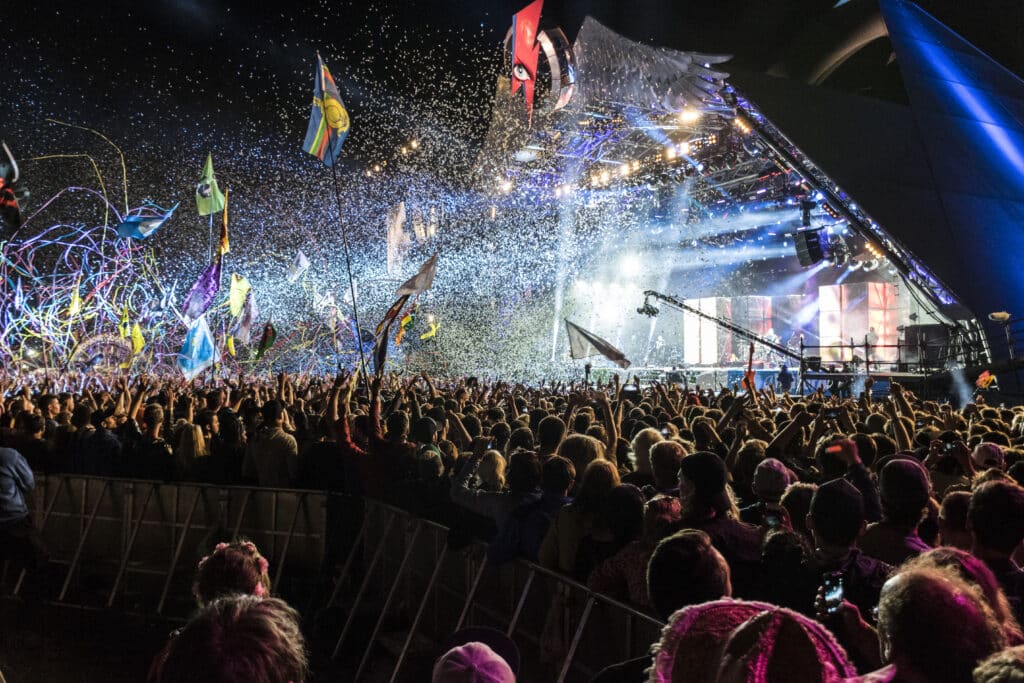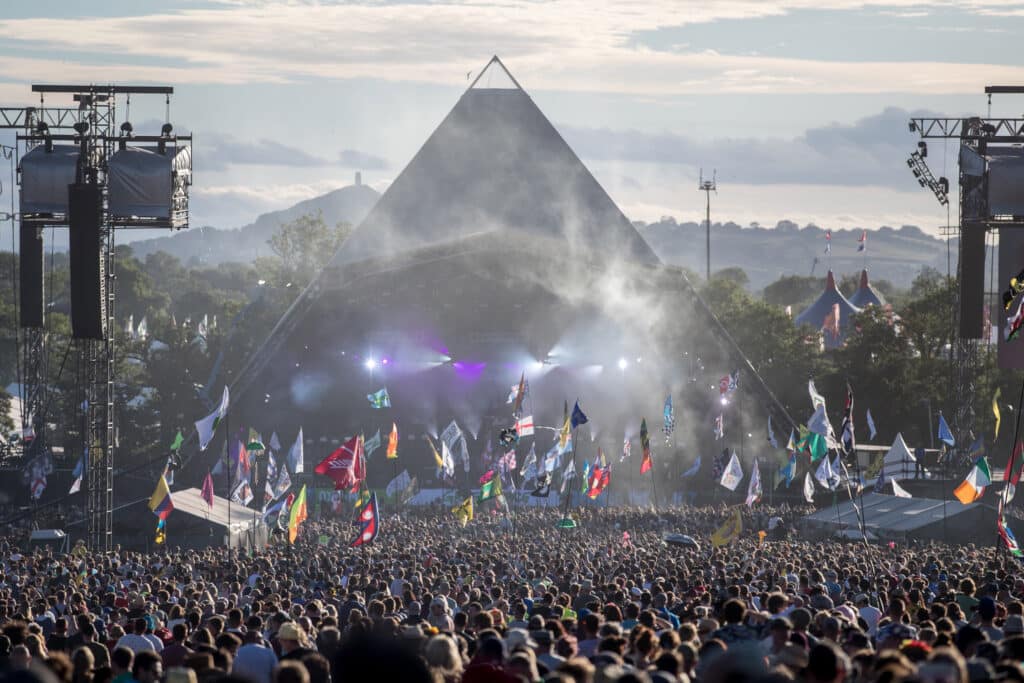It’s July and we’re now officially deep into festival season. The sun is shining, the temperature is increasing and tents around the world are being pegged up as people prepare to watch some live music in a field. Glastonbury, the largest greenfield festival in the world, recently came to a close. After 2 years off due to covid, the famous festival opened its doors to just under 300,000 people and also to some quite incredible artists.
The likes of Billie Eilish, Paul McCartney, Kendrick Lamar, Dianna Ross and many more graced the stage in what is being referred to as one of the greatest Glastonbury’s ever. But today I want to focus on why this festival is so special, the history behind it, and perhaps why places like Glastonbury have aided political reform.
What is Glastonbury Festival?
Glastonbury is a music and arts festival that takes place in the large fields of Somerset, UK, every year. It is located in 900 acres of green field, which is why it calls itself the largest green-field music and performing arts festival in the world. That can be seen as quite a confusing statement – I suppose the largest purple-field festival is somewhere else? Anyway, Glastonbury is undoubtedly massive and boasts around 100 stages, all of which show either music or some sort of live performance.

When I was growing up, I was always in awe of people who got tickets for Glastonbury, which are some of the most competitive tickets to get. Every year people sit at their computers, friends sit around them, all using their best Mark Zuckerberg impressions to try and be the ones who beat the code and get those valuable tickets. In 20 minutes, they all sell out. In fact, for this year’s Glastonbury, which people bought tickets for in 2019, 2.4 million fans tried to purchase tickets – only under 300,000 got them. As you can see, it’s a sought after event. To make matters even more exclusive, the festival website states:
“Tickets for Glastonbury Festival are personalised with a photo of the ticket holder and cannot be transferred to another recipient. Any tickets we suspect are being offered for sale will be cancelled and admission to the Festival refused.”
I remember the year that I went to Reading festival when I was 18. This was a much smaller festival – perhaps 90,000 people – and far fewer stages. I waited until the day before and bought one from a random guy on Twitter. With that, there was no worry about the ticket belonging to anyone. However, Glastonbury is aware of its popularity and awe-factor, therefore they ensure that people don’t resell their tickets for much more. Because, the truth is, people would buy them for much more. So, why is Glastonbury so special? Festival Squad writes:
“If you combined a Disney World made for adults, a carnival, a music festival, a spiritual center and a worldwide cook-off together, you would still not wind up with the creative, mind-blowing concoction that is Glastonbury. Ripped out of a page of the most wild story book ever, this festival reigns as one of the most sought after experiences in the world.”
Glastonbury is different because it really offers everything. It offers headline artists from every genre of music, it offers performances from great theatre companies, it offers some of the best food in the world and it has varying activities fitting for various ages. Like Woodstock was in the 70s, Glastonbury is a celebration of life. It is optimistic.
The History
To understand the importance of Glastonbury, it might help to understand its fruitful, 50 year past. Sometimes to find significance you must look back, as well as forwards.
1970s
Glastonbury festival began in 1970. However, it wasn’t called that, it was called ‘Pilton Pop, Folk & Blues Festival’. Doesn’t really have the same ring to it, does it? The organiser Mr Michael Eavis and he was inspired to throw his own festival at Worthy Farm. The headliner, at that time, was the Kinks. However, they dropped out at the last minute and T. Rex replaced them. The poster read: “Sheltered fields for camping! All food at fair prices! All farms milk FREE and Ox roast!”. Plus, even better, the tickets were £1 each. Can you imagine that? Nowadays, tickets cost around £280-300. 1970 was the beginning of the world-famous pyramid stage, which is now known as Glastonbury’s most iconic stage. Shaped like Giza pyramids in Egypt, this venue has had some incredible acts perform there. Of course, in the 70s, the stage was an odd-looking, badly built contraption. But now, it’s quite the spectacle.
1980s

After sporadic years on and off and a change of management, in 1981 Michael Eavis took over the project once more and changed the name to Glastonbury Festival. This was when the event began becoming political, Portobello Farm writes:
“The event was organised in conjunction with the Campaign for Nuclear Disarmament (CND), in order to help push the peace movement at the time. Michael Eavis convinced the CND that the event would be profitable in order to gain their support, this turned out to be true as he handed over approximately £20,000 to the cause.”
The festival promoting unity between people and Earth has continued throughout its history. In fact, a few years ago, David Attenbourugh was celebrated as one of the mystery guests of the festival. As the 80s continued, the festival grew. Van Morrison, Madness, The Smiths and many others all laid their mark on the newly built Pyramid Stage. Plus, in partnership with neighbouring farms, the festival was able to increase in size.
1990s
This was the decade of Glastonbury beginning to make history. In 1994, the Levellers headlined the festival and received its biggest ever crowd. 300,000 people came to watch the performance. Plus, it was this year when the festival was broadcasted on National TV. Channel 4 covered both the two main stages. Glastonbury festival was becoming a globally known festival.
2000s
As the century turned, Glastonbury festival became iconic. There’s no way that Michael Eavis, back in the 70s, could’ve foresaw what his passion project was to become. The Pyramid Stage was rebuilt again – it was 100ft high and looked stunning. This cemented it as the most known and loved landmark at the festival. Furthermore, as Glastonbury grew in popularity, the tickets began to sell out faster and faster. In 2003, they sold out in 1 day and this became quicker as the years went on until, like with 2022, they sold out in 20 minutes.
Perhaps in the future the tickets will sell out in only 1 minute, although I’m not sure if the internet is quick enough for that yet. Throughout these years it’s also important to remember that some of the most iconic performers in history played. These include: Oasis, Stevie Wonder, David Bowie, Jay Z, Radiohead, Dolly Parton, Adele, Snoop Dogg, Beyonce, Neil Young, Paul Simon, Katy Perry, Arcade Fire, The Who, Johnny Cash, Florence & the Machine, Bruce Springsteen, The Killers, The Rolling Stones and the Cure.
2022
The most recent Glastonbury festival took place this year: 2022. The festival was from the 22-26th June. The majority of those who attended had bought tickets in 2019, but both the 2020 and 2021 festivals had been cancelled due to the pandemic. Therefore, this year’s festival was always going to be a very special one and, perhaps, the most special of them all. The festival organizer, Emily Eavis, had this to say about this year’s festival:

“Thank you to everyone who came here and made it so special. It surely was the best one yet! We’ve never had a build-up as long as this, obviously…We’ve never all collectively been through such an extreme time together…So to actually be able to see people there, welcome them in and just watch them streaming in and just running to pitch their tents up and fill the fields, it’s just an amazing feeling.”
With an incredible line up and an uncontrollable zeitgeist feeling of togetherness, perhaps it was the best one yet.
Final Thoughts
I have never been to Glastonbury and I have to live with that everyday. However, my major goal for next year is to go. Nonetheless, as a UK citizen, I’m fully aware of the powers at be, and how great of a festival it is. I think it is a great example of the importance of festivals. I’ve written before about the power of festival culture, and I think that Glastonbury – like Woodstock and others – is a great example of that. It was built simply for a few people to come together, enjoy live music and enjoy life. 50 years later, this festival now still has that same essence, but it hosts a quarter of a million people. In my opinion, as long as festivals exist, free-thought and expression does too. Long live Glastonbury.
Thanks for coming our way! Welcome to Cannadelics.com; where it’s our goal to report on the most interesting stories in cannabis, hallucinogens, and the general drug world. Join us frequently to stay in-the-loop with top stories; and check out the Cannadelics Weekly Newsletter, so you’re never late to get the news.